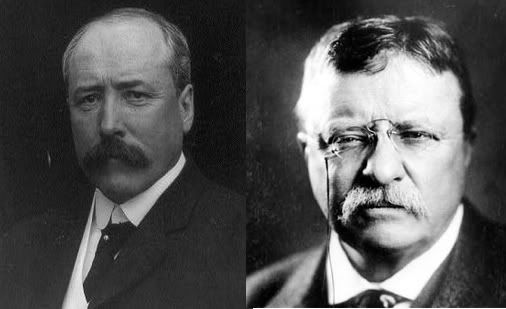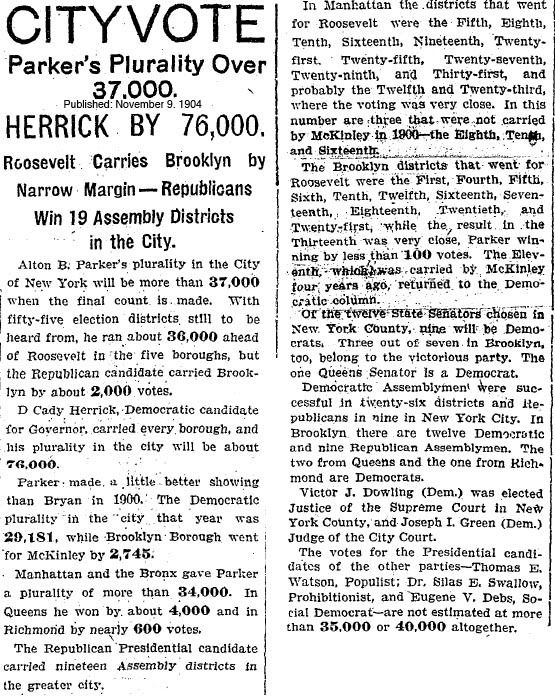
Roosevelt won New York State in 1904, but lost New York City

from the nytimes
Theodore Roosevelt was yesterday elected President of the United States for four years more, overwhelming majorities having been given to the Republican Electoral tickets in all of the States which had been classed as doubtful. The returns received up to midnight indicate that Roosevelt will have 325 votes in the Electoral College to 151 for his opponent, Alton B. Parker. The total number of votes in the Electoral College is 476, of which 239 are necessary to a choice. Mr. Roosevelt, therefore, will have a majority in the Electoral College of 174. The only State about whose Electoral vote there was any doubt at a late hour was Maryland. The returns indicated that it had gone Republican by several thousand, but the Democratic State Committee had not abandoned hope. As soon as it became certain that he had carried the country Mr. Roosevelt issued the following statement at the White House, in Washington: "Washington. Nov. 8, 1904. "I am deeply sensible of the honor done me by the American people in thus expressing their confidence in what I have done and have tried to do. I appreciate to the full the solemn responsibility this confidence imposes upon me, and I shall do all that in my power lies not to forfeit it. On the Fourth of March next I shall have served three and one-half years, and this three and one-half years constitutes my first term. The wise custom which limits the Presidency to two terms regards the substance and not the form. Under no circumstances will I be a candidate for or accept another nomination." The polls closed in New York at 5 o'clock and the people were not kept long in suspense as to the result in New York State and the Nation. As early as 7:30 o'clock August Belmont, who was at the Democratic National headquarters receiving returns, conceded the election of President Roosevelt by "an overwhelming majority." By 8 o'clock those in charge of returns at Democratic headquarters were willing to concede that Mr. Roosevelt had carried every doubtful State in the country. The figures which came in from New York, New Jersey, Connecticut, Indiana, and West Virginia were stunning to the Democratic managers. In none of the bulletins was there a single ray of hope for the Democrats, and as early as 8:30 o'clock a telegram was sent to Judge Parker informing him of his defeat. Returns from New York State up to midnight indicated that Roosevelt would have a plurality of 186,000 in the State. His indicated plurality above the Bronx line was 223,000, while Parker's indicated plurality in New York City was 37,000. Higgin's plurality for Governor will be about 85,000. The Republicans of the State of New York retained their hold on the Legislature, electing on the face of the returns as this edition for The Times went to press, 36 members of the Senate to 14 Democrats, and 104 members of Assembly to 46 Democrats. This is a clean Republican gain of 7 in the Senate and 7 in the Assembly. Districts that went Republican only when McKinley ran in 1896 were this year again turned into the Republican column. The returns for Congress show that the Republicans have elected 229 members of the House, and the Democrats 157, thus giving the Republicans 72 majority. In New Jersey the indicated plurality for Roosevelt is 80,000, and the Republican candidate for Governor, Edward C. Higgens, will have about 85,000. Connecticut has a plurality of 23,000 for Roosevelt. A. Heston Robertson, the Democratic candidate for Governor, ran ahead of the ticket, but Henry Roberts, the present Lieutenant Governor, was elected to a plurality of about 20,000.
Indiana went 50,000 for Roosevelt. The latest returns indicated 30,000 plurality for the Republicans Electoral ticket in Wisconsin. La Follette, the regular Republican candidate for Governor in Wisconsin, ran behind the Electoral ticket, but the returns indicate his election. West Virginia, the home State of Henry Gassaway Davis, the Democratic candidate for Vice President, gave 23,000 plurality for Roosevelt and Fairbanks. The latest returns from Colorado indicate that the State went for Roosevelt by a small plurality and that Peabody, the Republican candidate for Governor, won by a narrow margin. Maryland was claimed by both sides at midnight, but the latest returns indicated that the State would be Republican by a small plurality. Massachusetts furnished a surprise by electing William L. Douglas, Democrat, Governor of the State, although the plurality for Roosevelt and Fairbanks was in the neighborhood of 80,000. Joseph W. Folk is elected Governor of Missouri by a plurality estimated at 40,000, but the returns indicated that Parker was running behind. He probably will carry the State by 35,000. While complete returns were lacking at 1:30 o'clock it seemed probable that the Democrats had elected Governors in Nebraska and possibly West Virginia. In the latter State the vote is very close, but the indications are that Cornwell, the Democratic candidate, has outrun the National ticket and will pull through. Montana also reverses her Electoral vote on State issues and elects a Democratic Governor.


























No comments:
Post a Comment